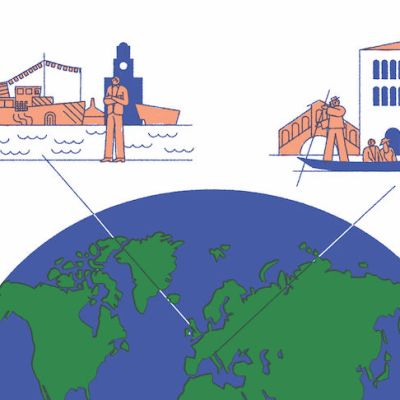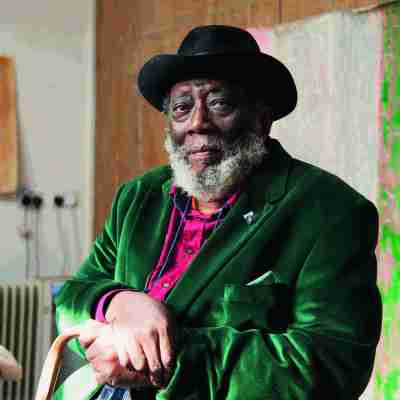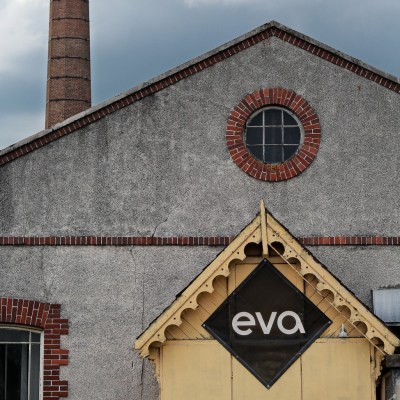The last thing I heard from Okwui Enwezor came in an email exchange with the group that had worked with him on Documenta 11, on 14 February. The reason for the exchange was the recent death of Andreas Seiler, a beloved member of the staff of Documenta who had assisted Okwui – and taken good care of all of us – while we were working on the Kassel exhibition. In that email Okwui wrote: ‘The living must mourn the dead and celebrate their lives.’ The tone, which was unmistakably his, rang to me both heavier and more sorrowful than ever.
I met Okwui more than two decades ago, at the NoHo Star in downtown Manhattan. Monica Amor, who later became my wife, introduced us. Okwui was there with Dan Cameron. We hit it off from the start. I remember his contagious laughter and authoritative voice, and his big hands gesticulating incessantly. Okwui was just back from his work organising the second Johannesburg Biennale, an exhibition in which he had presided over a group of international curators that included Octavio Zaya and Gerardo Mosquera, among others.
New York is many things for many different people. For us, the city in the 1990s offered a platform where a generation of critics and curators from all over the world could come together. For the very first time, art institutions in the US and Western Europe had made a space for curators coming from places like Asia, Africa and South America to present the work of artists from those contexts. For us, it was a matter of articulating a challenge to the canonical narratives of art as constituted and cemented in the West. It was exhilarating to meet and work together. Hou Hanru, at the time living in Paris, Hans Ulrich Obrist, always on the move, Octavio Zaya from Spain, Vasif Kortun from Turkey, Francesco Bonami from Italy, Okwui, of course, from Nigeria, and many others, including myself, a relatively recent arrival from Rosario, Argentina.
Okwui always seemed older (and wiser) than his age and he relished that fact. He was somehow convinced that this required him to assume a position of gravitas that actually came naturally to him. He was not prone to talk about the past but through the years much was revealed. When he would mention that his entire family was displaced by the Biafra war I would remember my father in Argentina urging me to eat the food in my plate because there were so many children starving in Biafra. The unlikely friendship between a Nigerian and an Argentine guy was peppered with soccer jokes and at times punctuated by mishaps, delays and misunderstandings. I was certainly not happy when he came to my wedding too late to escort my mother-in-law into Saint Patrick’s Old Cathedral as he was supposed to do. But then again, I was wearing the blue suit by Hedi Slimane that he had chosen for me.
The main entrance to the Museum Fridericianum during Documenta 11 (2002). Photo: © documenta archiv/Ryszard Kasiewicz

In the autumn of 1998, Okwui travelled to Berlin to be interviewed for the position of artistic director of Documenta. I remember the phone call, late at night, when he told me that his proposal had been selected. Everything would become a whirlwind after that. He would return from Germany trailing a television film crew, the articles would start to pop up in magazines and newspapers. He would be offered bottles of champagne at restaurants. He was the first African to ever lead a show that was still considered the most influential artistic forum in the world, and the responsibility was simply enormous. Okwui understood perfectly well what was at stake in Documenta 11, and he put all his tremendous energy to the task.
In 2002, one afternoon after Documenta had opened and the stress was behind, we read each other our poems. Okwui was a voracious reader, with an encyclopaedic knowledge of Latin American literature. I remember thinking that his poetry sounded a bit like Federico García Lorca’s, but now I think that it was in fact Pablo Neruda who had a greater impact. Like Neruda, Okwui was in equal parts a consummate poet and a well-mannered and astute diplomat. He had a temper: I remember his indignation when I tried to make the case that we were, all of us, ‘exhibition-makers’, in the words of Harald Szeemann. He firmly believed that Third World intellectuals were not afforded the luxury of such specialised roles. We had, in his view, a wider task: to perform a fundamental critique of the ways in which power relations had shaped the understanding of art in the West. Our role was to contest canonical narratives and to create the basis for a more generous understanding of what art is, and of the roles it performs in different geopolitical contexts. Postcolonial theory was his epistemological framework, one that he himself helped shaped through his exhibitions and essays, but his practice was tethered to an extraordinary ability to relate to living artists and to a refined sensibility and attention to individual works. Some of the tributes published after his death mention Okwui as one of the most important curators of his generation. I believe he was more than that. He was one of the most important public intellectuals of our times. That he combined such a great curiosity for both ideas and people with a passionate commitment to criticality and a deep understanding of art and living artists is nothing short of miraculous.
Photo: © documenta archiv/Ryszard Kasiewicz

I had many differences with Okwui while working on the show as part of his Documenta team, but our friendship ultimately always eased conflict. What I could never understand was how he could be so endlessly patient with artists and with friends, and so impatient with many of the art institutions for which he worked. He recognised in the many rigidities of institutional life a sign of the deeply rooted exercise of power and domination that he instinctively refused. For all his diplomatic skills and his capacity to develop an extremely careful and objective analysis of whatever specific situation he would take on, he simply could not help rebelling against authoritarianism writ large. It was in his nature and, in many cases, it got him in trouble.
Mark Nash, who was very close to Okwui until his death, has written that he seemed to have considered Documenta his most important accomplishment. Indeed, the show has come to be recognised as a watershed moment in contemporary art, an indication that the old rigid moulds had been broken and of a collective coming to terms with the evidence that great art was produced globally. But at the time, Okwui, his team, and the show, were viciously attacked. I still remember reading a newspaper article where we were described as ‘biting the hand that fed us’! The reception of Documenta 11 at the time did not scathe him in the least. It would instead become a badge of honour for years to come.
The tide slowly changed, but I believe that at the time Okwui felt that he was not given the right opportunities to continue his work. After Documenta he was ready for a deeper, fuller exploration of the implications of considering art beyond a canonical framework, but the chance to articulate that vision institutionally was simply not there. Years later, once appointed director at the Haus der Kunst in Munich, he would begin a task that had been clear in his mind for several years, a series of exhibitions remapping the history of modern and contemporary art from a global perspective. He was able to realise only the first of those shows: ‘Postwar: Art Between the Pacific and the Atlantic, 1945–1965’. Surely, nobody was better equipped than Okwui for that task, but his death leaves us with the responsibility to complete his work, to engage in dialogue with his stated objectives.
I did not see much of Okwui after he accepted the position in Munich but, coincidentally, I was there the very day when he took on his official role as director. I clearly remember his exasperation with the formalities of the ceremony – we escaped the party early to have dinner together. I saw him again in Philadelphia with my family and then in New York alone – the last time just a few months after the closing of his Venice Biennale in 2015. He was sick already, but plans were made for another collaborative project after the intended trilogy of global shows at Munich, a radical homage to the ‘Magiciens de la Terre’ exhibition of 1989 that would turn the very notion of art in the West upside down. After that, we spoke on the phone sporadically but Okwui’s distant presence remained, always reassuring.
Jorge Luis Borges once wrote that the world continues to turn because in each generation there are 10,000 people who are just. I feel wholeheartedly that Okwui Enwezor was one of Borges’ conjurados. The world was better because Okwui was around, fighting for what he believed. It happens that historical times coalesce around a place, a specific moment, the deeds or words of a person. Okwui’s name is and will continue to be a sign of the times, of a deep and lasting change in our understanding of art – much for the better. That his work ought to be continued should be considered a blessing.
Carlos Basualdo is the Keith L. and Katherine Sachs Senior Curator of Contemporary Art at the Philadelphia Museum of Art.


